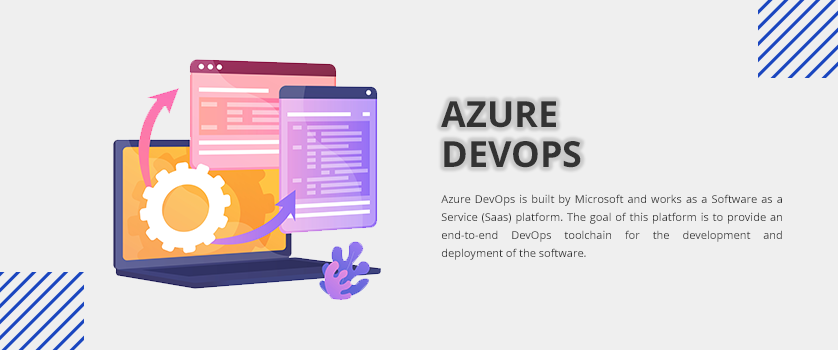


Azure DevOps is built by Microsoft and works as a Software as a Service (Saas) platform. The goal of this platform is to provide an end-to-end DevOps toolchain for the development and deployment of the software. The best part of the Azure DevOps is that it lets you integrate various tools that are built for orchestrating a DevOps toolchain. Because of such incredible features, people in the DevOps community prefer Azure DevOps.
Azure DevOps is a blend of numerous services, where each service has a role to play that includes:
Dashboard Control: With Azure DevOps’s built-in dashboard feature, you can move to various aspects of the project like adding people, managing the dashboard, and configuring dashboard widgets.
Improved Source Control: Since Azure DevOps systems support two types of source control, which includes Git (distributed) or Team Foundation Version Control (TFVC), it lets you manage Azure Git tags, review, download, and edit files to look for any changes in the history.
Plan and Track: Some features of the Azure DevOps lets you plan and track the progress of your work. For example, you can plan your work using Agile methods such as Scrum, Scrumban, or Kanban. On the other hand, you can update relevant work items, manage product backlogs, or even plan sprints and Kanboards to visualize your workflow.
Continuous Integration and Deployment: CI and CD are the backbones of the DevOps and Azure DevOps do it so well that many developers like it. For instance, using Azure pipelines, developers can automate the designing process that includes defining the builds, creating test instructions, and managing simultaneous releases.
Manual and Exploratory Testing Support: Every development team needs a comprehensive solution for their product, hence, they always look for tools that provide an extensive approach that can stand minute to the major tasks effortlessly. For instance, the testing process may require a manual, exploratory, or continuous testing approach but it’s hard to accomplish at a single platform. However, with Azure DevOps, you get multiple test features in one place and you can customize workflow, trace end-to-end results, and see charts related to the test activity too.
|
Basis of Comparison |
Azure DevOps |
AWS DevOps |
|
Service Integration |
It lets you integrate Azure VM, Azure App Services, and SQL databases. Plus, you can easily add third-party tools like Jenkins. |
With a single click, you can integrate many AWS services like EC2, S3, and Beanstalk. |
|
Package Management |
Azure has its own package manager tool called Azure Artifacts to manage the packages like Nuget, Maven, etc. |
To manage packages in AWS, you need to integrate external or third-party package managers like Artifactory. |
|
Pricing and Best Features |
Azure’s market share is relatively lesser than the AWS, hence it offers economical pricing. Also, it offers a wide range of extensions to its users, like Kanban boards and workflows. |
AWS has a first-mover advantage, thus it charges more than any other Cloud platform available out there. But, it helps developers easily automate a complete code deployment. |
DevOps is known for continuous integration (CI) and continuous delivery (CD). In simple words, it eases the processes seamlessly. But most of the DevOps tools and processes or even when it comes to taking the advantage of the Cloud resources, DevOps seems out of the sight for Windows users. Since Azure DevOps is the product of Microsoft, it provides a DevOps solution to Windows users.
To understand it better, let’s imagine that your organization’s environment relies on Microsoft Windows like computers (desktop and laptops), exchange email, office spread, documents and presentations, SQL server, and back-office servers. In this situation, moving to a traditional DevOps platform can be difficult, as most tools and Cloud platforms work well on Linux operating systems. However, with Azure DevOps, it’s easy, as it provides seamless integration with Cloud platforms and other automation tools (including third-party tools) even for Windows users.
Another reason why people prefer Azure DevOps over DevOps is that it saves money. Since Azure DevOps lets you migrate your existing environment over a Cloud platform using the same resources, organizations can save a lot of money.
DevOps is emerging as one of the industry’s dominant trends. It is a way to bring together software developers and operations professionals in a single team. However, jumping to a new solution while ignoring all your existing resources can be a tough task for many organizations. Hence, Azure DevOps services come into play and solve all the worries, and allows you to provide top-notch, yet low-cost DevOps solutions to your users.